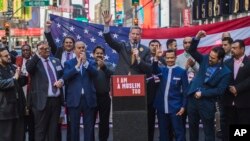More than one in three U.S. Muslims fear they could be targeted by white supremacist groups following President Donald Trump's election and 42 percent say their children have been bullied in school because of their faith, a survey found.
That fear contributes to a lower-than-average rate of voting by adult Muslim citizens, according to a study released on Monday by the Institute for Social Policy and Understanding.
Cracking down on what he called "radical Islamic terrorists" and restricting travel from certain Middle Eastern countries have been major elements of Trump's presidency.
The study found that 38 percent of Muslims feared they could be victimized by white supremacist groups, a rate far higher than other major religions, and nearly one in five had made plans to leave the United States "if it becomes necessary."
By comparison, 27 percent of Jews, 11 percent of Protestants and 8 percent of Roman Catholics and 16 percent of the religiously unaffiliated voiced such concerns.
Forty-two percent of Muslims saying their school-aged children had been bullied because of their faith, more than quadruple the rate of the general population. One in four cases involved a teacher, the survey found.
Just 61 percent of Muslims said they had voted in the 2016 presidential election, fewer than any other major religious group or the public at large, according to the survey of 2,389 people conducted Jan. 4 through Jan. 23.
One in three Muslims who did not vote said it was because they did not like any of the candidates.
The survey had a margin of error of 5.1 percent among Muslims and 2.8 percent for the general public.
The survey period concluded three days after Trump took office and before actions, including presidential executive orders, to restrict travel from certain majority-Muslim countries.
At least four U.S. mosques, in Texas, Florida and Washington, have been the target of arson this year. Jewish Community Centers across the nation have been subject to more than 100 bomb threats - all of which have been hoaxes.
Half of Muslims polled said their faith leaders and organizations need to condemn terrorism, more than the 44 percent of the general public who held that view.
Muslim women and Muslims of Arab descent reported experiencing religious discrimination at higher rates than Muslim men and Muslims of other ethnicities, likely a result of their appearance more readily identifying them as Muslims.





